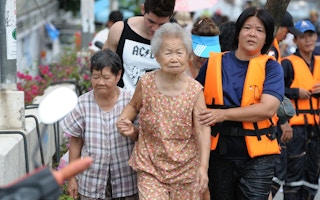As the world marks two years since Typhoon Haiyan tore through the Philippines, the world’s first Centre for Humanitarian Leadership has opened in Melbourne on Wednesday to help train the next generation of aid workers.
The centre, located at Deakin University in Burwood, will act as a hub for the ground breaking Humanitarian Leadership Program (HLP), which puts current and future aid workers through a rigorous course including a week-long simulated disaster in Indonesia.
The opening comes as new figures reveal the cost of disasters in Asia – the most disaster-prone region in the world – to be a staggering $89.6 billion in 2014.
“Disasters in Asia cost the global economy tens of billions of dollars every year, and more and more are being caused by changing climate,” said Save the Children’s Stephen McDonald, who pioneered the program with Deakin University’s Associate Professor Phil Connors.
“Yet funding for overseas aid is decreasing at an alarming rate, meaning we need to be more efficient with every dollar spent and that starts with providing the most realistic and intensive training possible for aid workers so they can make the greatest difference during the next humanitarian response.”
Aid agency Save the Children teamed up with Deakin University to establish the HLP back in 2012 and now, with the support of the Ikea Foundation, have set up the Centre for Humanitarian Leadership.
This comes just days after the world marked two years since Typhoon Haiyan, which devastated much of the Philippines, killing over 6,000 people and completely destroying more than 500,000 homes.
“The majority of the world’s disasters take place in the Asia-Pacific, so it’s critical to have this centre and this program in the Asia-Pacific region,” said Associate Professor Connors from Deakin University, who was first approached about a potential leadership course by Mr McDonald back four years ago.
“When you look at the frequency and severity of disasters, the need for more effective humanitarianism is critical. In the space of three decades we’ve seen a three-fold increase in the number of disasters.”
The HLP, now in its 3rd year, has seen 230 students graduate, going on to use their skills responding to emergencies including Typhoon Haiyan in the Philippines, the Nepal earthquakes and Cyclone Pam in Vanuatu.
Per Heggenes, CEO of IKEA Foundation said he was thrilled to support such an important program and centre.
“Children are the ones suffering most during natural disaster. Our ability to save their lives and help them cope during initial stages depends on having capable humanitarian leaders on the ground, able to take the right decisions and provide appropriate support,” he said.
“With extreme weather events increasing due to climate change, we know we will need more aid workers ready for immediate leadership in challenging situations. We want to play our part in training and preparing aid workers to become effective leaders. We are calling for other businesses to join our efforts and do the same.”










